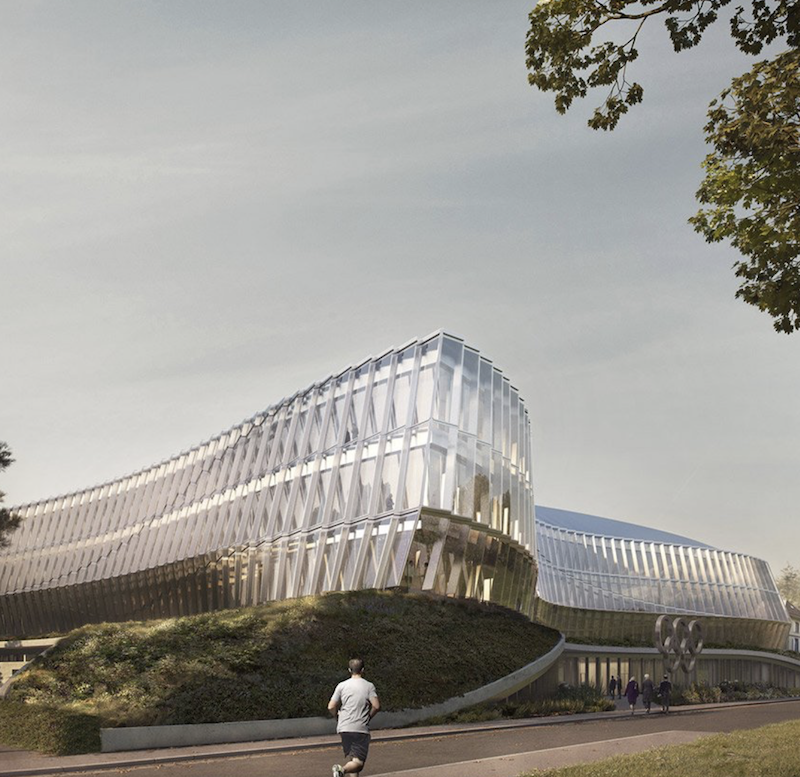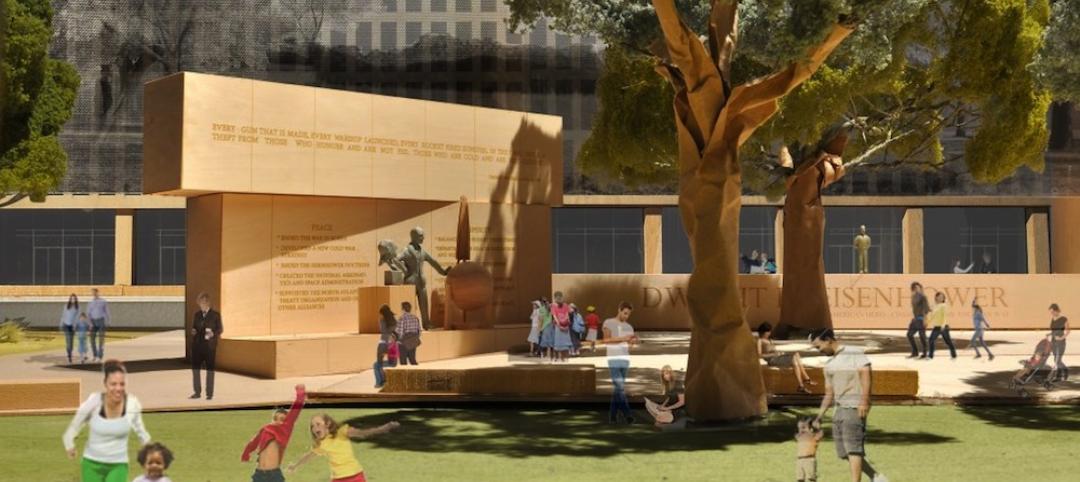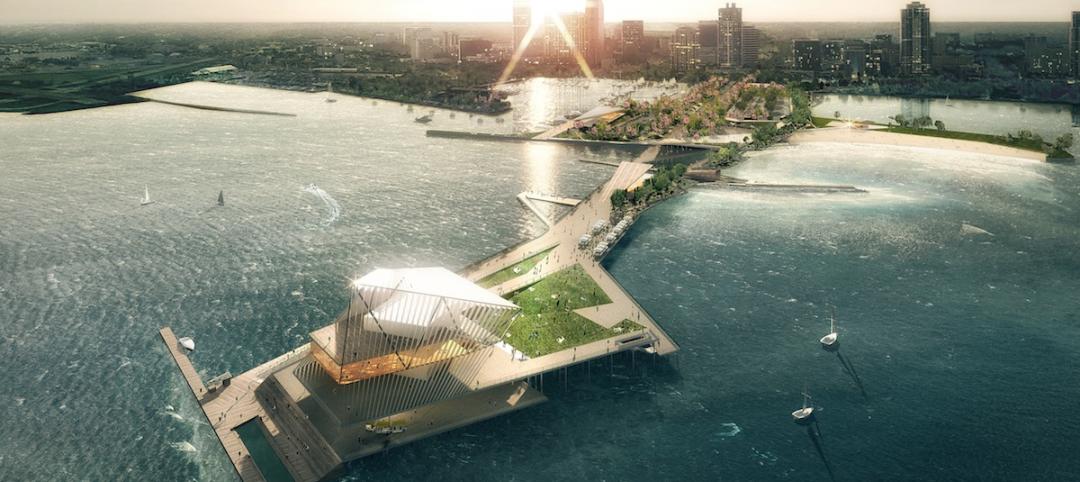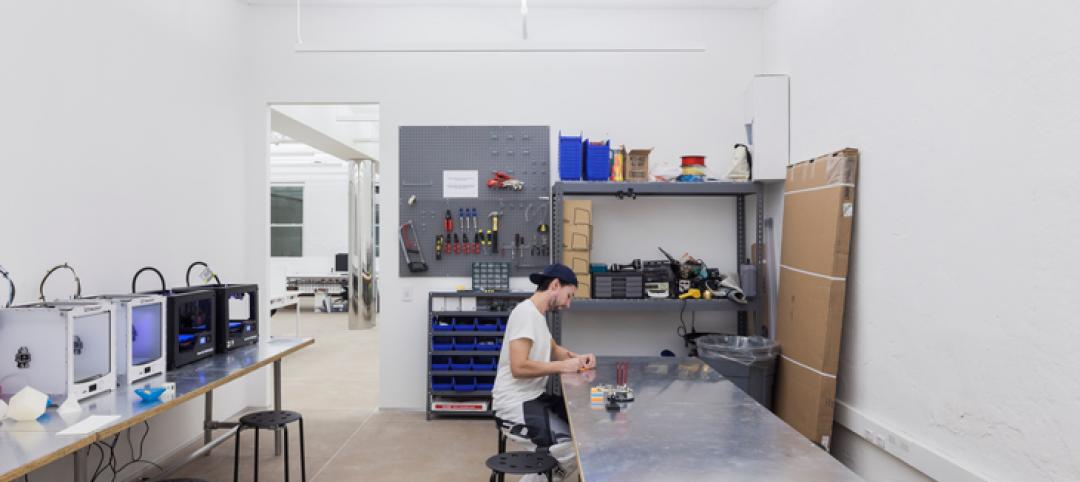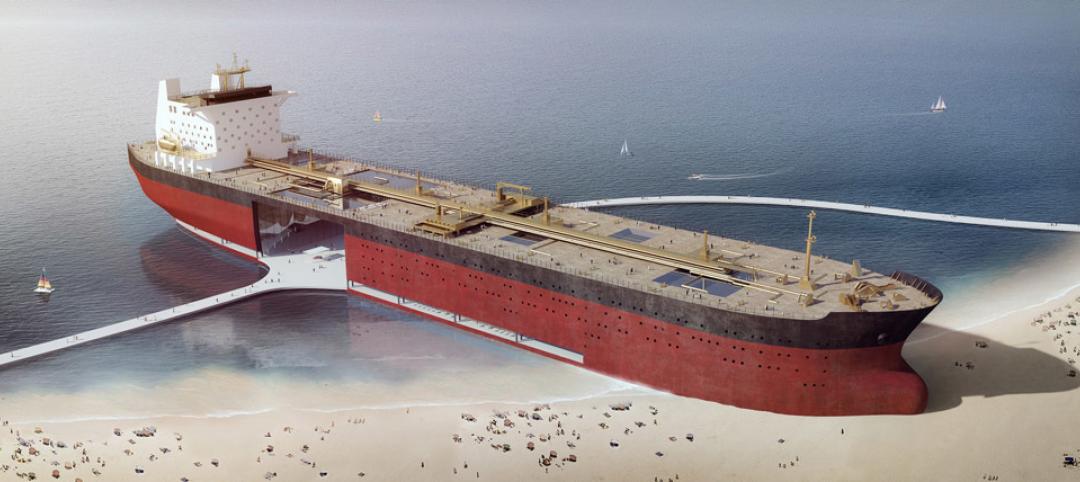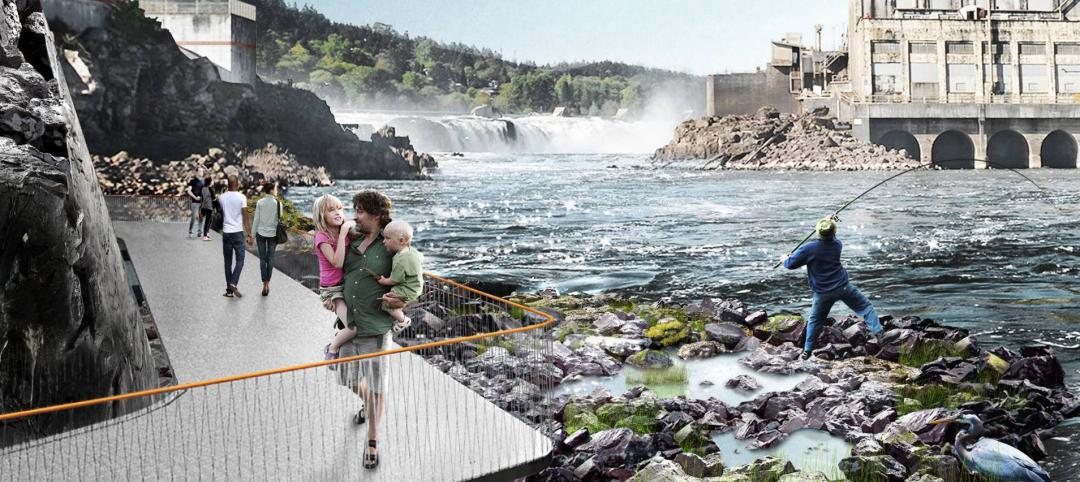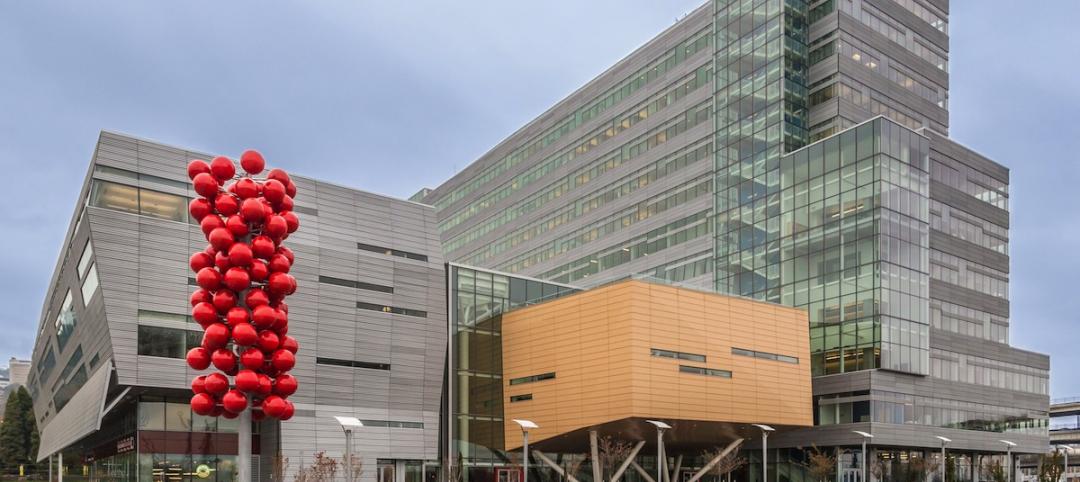On June 23, the International Olympic Committee (IOC) will inaugurate Olympic House, its new headquarters building in Lausanne, Switzerland, whose construction is nearing completion.
The building will allow the IOC to consolidate its staff of more than 500 people, who are currently scattered across several buildings in Lausanne. The design of the new building—by the architectural firms 3NX and IttenBrechbühl—reflects the Committee’s values and mission, according to Thomas Bach, IOC’s president.
Last week, Bach and Kim Herforth Nielsen, 3XN’s cofounder and Principal, presented a preview of Olympic House to the business press at The Plaza Hotel in New York.
The 145 million Swiss Franc (US$146 million) building, with 22,000 sm (236,806 sf) of usable space, will be located within Louis Bourget Park, one of Lausanne’s largest. Part of the park has been incorporated into the building’s design, whose key objectives correspond with the Olympics’ principles of movement, transparency, flexibility, sustainability, and collaboration.
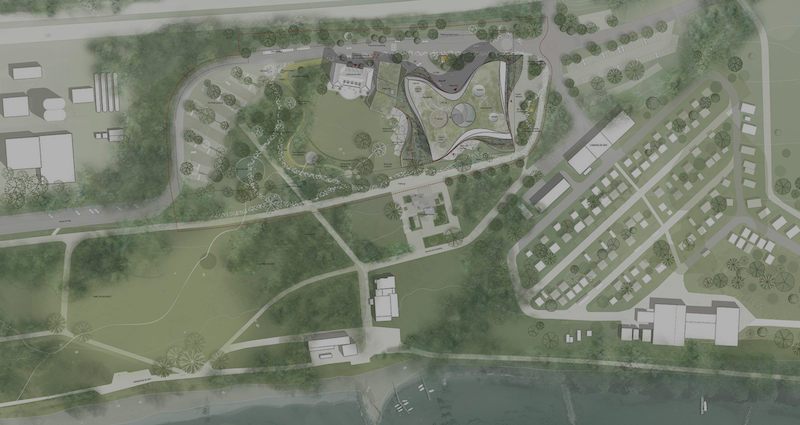 Olympic House is situated within one of Lausanne's largest parks. Image: 3XN
Olympic House is situated within one of Lausanne's largest parks. Image: 3XN
“It’s important to have a story when designing a building,” said Nielsen of Copenhagen-based 3XN, whose design for Olympic House was selected by the IOC Executive Board from 114 entries.
For example, the top of Olympic House is shaped, symbolically, like a dove, representing peace. And in the building’s basement will be a sculpture of an olive tree.
The building façade’s undulating flow pays tribute to athletic movement. The building’s interior—which is supported by only four service cores and 14 pillars—speaks to its structural flexibility. Olympic House is also striving to meet international sustainability standards established by LEED, Minergie (the Swiss energy standard), and SNBS (the Swiss sustainable building standard).
A pumping station will draw water from nearby Lake Geneva to cool and heat the building. Solar panels on the roof will generate 10% of the building’s electricity use, equivalent to the consumption of 60 Swiss households. Olympic House’s shape optimizes daylight coming into the building. The facility will also collect rainwater to recycle for plant irrigation and toilet flushing. (The building’s water consumption is expected to by 60% of a comparable office building.)
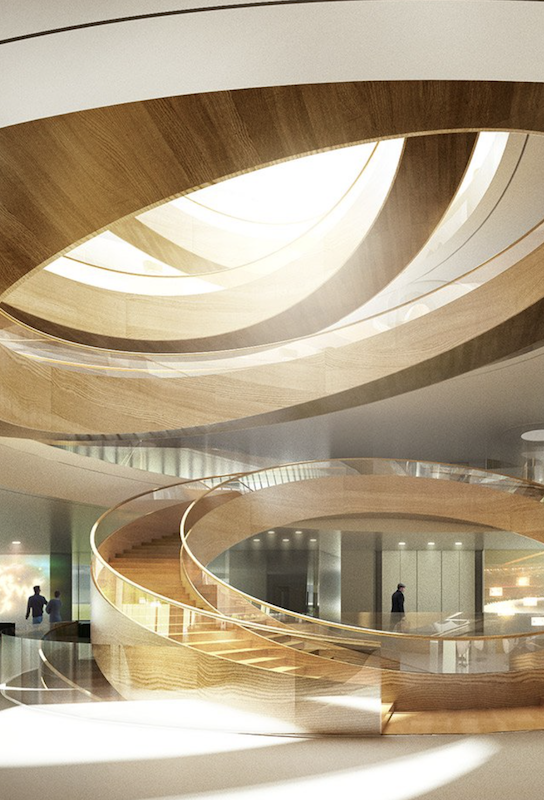
A steel-and-wood-clad circular staircase is designed to suggest the five Olympic rings. Image: 3XN
One of the more striking design features of Olympic House is its steel-and-wood-clad Unity Staircase, which soars the full height of the building. Intended to reference the five Olympic rings, the staircase will unify the building’s floors. It is being presented as a visual expression of collaboration between IOC and its stakeholders. (Worldwide, there are 206 national Olympic committees.)
IOC is also collaborating with three worldwide Olympic partners: Dow, which is helping the Committee achieve its carbon neutrality goals; Toyota, which is developing a pilot program to install hydrogen stations in Switzerland for vehicles powered by fuel cells; and Panasonic, which is supplying A/V equipment for Olympic House’s meeting rooms.
IOC’s investment in this project includes the renovation of Le Château de Vidy, an 18th Century castle located within Olympic House’s public space.
Founded in Paris in 1894, IOC has undergone several significant reforms under the leadership of the 65-year-old Bach, a German lawyer and Olympic gold medalist in fencing, who became the Committee’s ninth president in September 2013. These reforms include a commitment to publishing an annual financial report, strengthening the role of its Ethics Committee, and auditing national committees that receive money from IOC. The organization is committed to redistributing 90% of its annual revenue to athletes from developing countries.
Related Stories
Cultural Facilities | Jul 14, 2015
Massive exhibition space in Inner Mongolia replicates steppe landscape
To mimic the Central Asian steppe landscape of the Chinese province Inner Mongolia, Kuanlu Architects proposed the construction of an exhibition plaza that can be walked on.
Cultural Facilities | Jul 13, 2015
German architect proposes construction of mountain near Berlin
The architect wants to create the world’s largest man-made mountain, at 3,280 feet.
Cultural Facilities | Jul 9, 2015
Gehry's Eisenhower Memorial plan gets OK from D.C. planning commission
Despite the thumbs up, disputes over costs may keep the $142 million work from ever being built.
Smart Buildings | Jul 9, 2015
St. Petersburg Pier’s dramatic makeover gets green light from city officials
The Pier Park will be a platform for a multitude of smaller and more flexible programs and experiences for tourists and the local community.
Museums | Jun 28, 2015
Manhattan's New Museum debuts first museum-led incubator space
Part studio, part shared workplace, part lab, and part professional development program, NEW INC connects design with technology, the arts with the market, students with seasoned practitioners, and the museum with the world.
Museums | Jun 23, 2015
Moreau Kusunoki's 'art in the city' scheme wins Guggenheim Helsinki design competition
The firm’s design concept makes use of the museum’s site, turning it into a bustling, well-connected waterfront hub.
Cultural Facilities | Jun 10, 2015
Artists turn oil tankers into architecture
Four Dutch artists propose transforming tankers into monuments with mixed-use space.
Cultural Facilities | Jun 5, 2015
Chicago’s 606 elevated park opens
The 2.7-mile stretch repurposes an abandoned elevated train track that snakes through Humboldt Park and Bucktown.
Cultural Facilities | Jun 2, 2015
Snøhetta and Dialog to revitalize Willamette Falls area in Oregon
As part of the plan, an abandoned paper mill will be repurposed, while landscaping and running trails will be added.
BIM and Information Technology | May 27, 2015
4 projects honored with AIA TAP Innovation Awards for excellence in BIM and project delivery
Morphosis Architects' Emerson College building in Los Angeles and the University of Delaware’s ISE Lab are among the projects honored by AIA for their use of BIM/VDC tools.


